Portable propane heaters can be sources of fast, efficient heat. They heat up quickly, they produce a lot of heat, and their very efficient, so they use very little propane.
But can you use a propane heater indoors? Is it safe? And if not, are there things you can do to make it safe?
Today we’re taking a look at the question of whether it’s safe to use propane heaters indoors, and in particular in the small space of an RV.
- 1) What Is a Propane Heater?
- 2) Can You Use a Propane Heater Indoors to Heat Your RV?
- 3) Potential Dangers of Using a Propane Heater Indoors
-
4)
How to Safely Use a Propane Heater Indoors
- 4.1) Open a window or vent
- 4.2) Install carbon monoxide detectors
- 4.3) Run a dehumidifier
- 4.4) Buy a heater with tip-over protection
- 4.5) Keep the heater away from flammable objects
- 4.6) Buy a heater with a low oxygen sensor
- 4.7) Monitor the color of the flame
- 4.8) Never use aerosol sprays when the heater is on
- 5) What Propane Heaters are Popular for RV Use?
- 6) Yes, We Use a Propane-Powered Heater In Our RV
What Is a Propane Heater?
A propane heater uses liquid propane (LP) fuel to heat an area or a room. Some can be used indoors and outdoors.
Propane heaters can be ignited either manually or automatically. Large propane heaters have blowers to heat even larger areas.
There are several different types of indoor propane heaters including portable, wall-mounted, forced air, and radiant indoor propane heaters.
Many propane heaters allow you to efficiently heat an area without using electricity. This is perhaps the most significant reason why an RVer might want a propane heater. This brings us to the point of this post…
Can You Use a Propane Heater Indoors to Heat Your RV?
You can – and we have for years. The most common types of propane heaters found in RVs are portable or wall-mounted propane heaters.
A propane heater can be the perfect way to take the fall chill out of your RV… or to heat the rig well during the cold winter months.
But first, you need to understand the pros and cons of heating with propane. More importantly, you need to know how to use a propane heater SAFELY. Understanding basic propane safety is key.
Potential Dangers of Using a Propane Heater Indoors
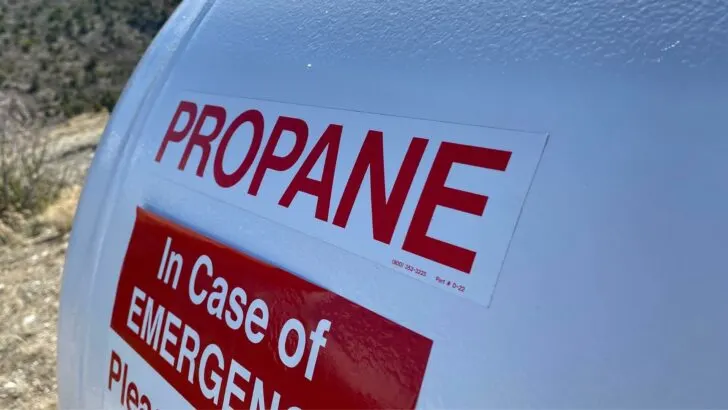
There are some dangers associated with using propane indoors. Knowing the potential dangers and how to prevent them is the key to safely using a propane heater indoors.
Let’s start by looking at the potential issues that can arise when using a propane heater indoors.
Carbon Monoxide Buildup
Carbon monoxide, a byproduct of the combustion process, can build up in an enclosed space.
A properly functioning propane heater (in a properly ventilated area) rarely has a carbon monoxide problem. If a propane heater malfunctions, however, it can produce dangerous levels of carbon monoxide due to incomplete combustion.
This could lead to carbon monoxide poisoning, especially if there’s insufficient ventilation in the area where the space heater is located.
Oxygen Depletion
As propane burns, oxygen from the surrounding air is consumed.
A properly functioning propane heater should be safe to use indoors with proper ventilation. Ventilation is key because insufficient ventilation can cause hypoxia (low oxygen levels in the body) as the oxygen is consumed to burn the gas.
Many propane heaters have oxygen sensors that will shut off the heater if low oxygen levels are detected.
Moisture Build-Up
Propane heaters tend to cause moisture build-up from combustion by-products. Moisture is an enemy of RVs. Condensation is somewhat unavoidable when using propane, so this is also important to address with proper ventilation.
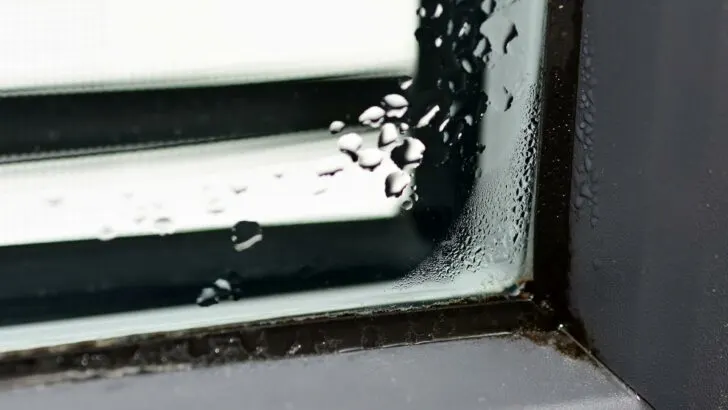
Condensation in an RV can lead to issues of mold, mildew, and eventually serious damage to the rig.
Tip-Over Fire Hazard
If an indoor propane space heater tips over, it can be a fire hazard. Pets, children, or even adults can inadvertently hit a small space heater, tipping it over.
This is why an automatic shutoff is such an important feature of a propane heater. The shutoff turns the heater off automatically in the event that the unit is tipped over.
Flammable Items Nearby
Indoor propane heaters need to be placed on a non-flammable floor or another surface. Curtains, drapes, and any other flammable items need to be kept clear of a propane heater.
Combustible Sprays
Combustible sprays should never be used in the vicinity of an indoor propane heater. Aerosol spray items such as hair spray, air fresheners, deodorant, furniture polish, etc. should never be used while a propane heater is on.
How to Safely Use a Propane Heater Indoors
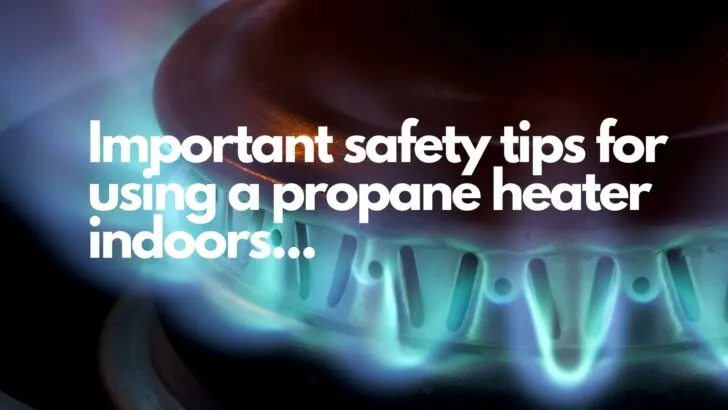
Propane heaters can absolutely be used indoors as long as some very important safety measures are taken.
Following are some important safety tips for using a propane heater indoors.
Open a window or vent
Keep a window or vent (or both) open to allow fresh air in… and to allow moisture to escape.
Install carbon monoxide detectors
Install high-quality carbon monoxide detectors and regularly check to make sure they’re working properly and have a good battery.
- HIGHEST QUALITY, most accurate electrochemical co sensor technology
- CONVENIENT, end of life chirping signal
Note that carbon monoxide detectors have a useful life of about 7 years.
We recommend reviewing our post “What Is an RV Propane Detector”. When it’s time to replace yours, you can follow Peter’s clear visual guide here:
Run a dehumidifier
Run some type of dehumidifier if the open window and/or vent isn’t enough to prevent moisture buildup.
This doesn’t necessarily need to be a big electric dehumidifier, by the way. There are many small, portable, inexpensive ones on the market. For more information, see our post on the best RV dehumidifiers.
Buy a heater with tip-over protection
Buy a sturdy heater that has tip-over protection. This feature is typically an automatic shutoff that engages should the unit tip over.
Be sure to keep your heater in an area where it’s unlikely to get knocked over. If that’s not possible, then you shouldn’t use a propane heater in your RV.
Keep the heater away from flammable objects
Always keep propane heaters away from curtains, drapes, rugs, and any other potentially flammable items.
Buy a heater with a low oxygen sensor
As noted in the previous section, a low oxygen sensor is another important feature of a good propane heater.
Monitor the color of the flame
Keep an eye on the color of the flame burning in your propane heater. A healthy flame will have a blue hue. A blue flame indicates complete combustion.
A yellow flame, a build-up of soot, and excessive condensation are three signs of incomplete combustion. Should these events occur, follow the manufacturer’s instructions to check the unit or have it evaluated by a professional.
Never use aerosol sprays when the heater is on
Be sure to never use any type of aerosolized products when your propane heater is running, especially in the vicinity of the heater.
Indoor propane heaters are safe as long as we pay attention to all of these safety tips.
What Propane Heaters are Popular for RV Use?
There are a number of good propane heaters on the market. Following are a few of the most popular among RVers and van campers.
Camco Wave-6 Catalytic Safety Heater
The Camco Wave-6 (as well as the smaller and larger Wave heaters) require no flame flue or chimney and use no electricity. There’s no fan or blower so the operation is essentially silent.
This is an indoor/outdoor unit with a piezo starter and a safety shutoff valve. It can be wall mounted or used as a floor unit with optional feet (sold separately).
This particular Wave 6 heater will heat up to a 230 sq ft space and is safe for operation at altitudes of up to 12,000 feet. Heat output is adjustable from 3,200 BTU to 6,000 BTU per hour.
The Wave 3 warms up to 130 sq ft of space (1,600-3,000 BTU) and is perfect for the Class B RV or van conversion.
The larger Wave 8 warms up to 290 sq ft (4,200-8,000 BTU).
All Wave heaters are for use in vented areas only.
- No flame, flue or chimney
- No electrical drain or battery connection make it the ideal solution for boon docking and dry camping
Mr. Heater Buddy
The popular Mr. Heater Buddy is a 4,000-9,000 BTU portable propane heater that uses 1 lb. cylinder propane tanks.
It has a small footprint with good heating capacity and is best for heating up to 200 sq. ft.
Using the (optional) swivel regulator allows you to instead use a remote gas supply. (Hose and filter are sold separately.)
These little units are easy to light by simply rotating the knob to the pilot position and then pushing it in. It has an integrated Piezo sparking mechanism to ignite the flame.
For safety features, this Mr. Buddy Heater has an Oxygen Depletion Sensor (ODS) as well as an accidental tip-over safety shut-off.
Note that if you regularly use the heater at altitudes over 7,000′ above sea level, the heater may shut off.
- Lightweight design for portability
- Durable steel construction with reliable valves that are safe and easy to use
Mr. Heater Big Buddy
This Mr. Heater Big Buddy portable propane heater comes with a 10-foot propane hose assembly and a propane tank refill adapter to connect to an external propane tank. If desired, it can also be fueled using the small, disposable 1 lb. canisters.
The Big Buddy Portable heats up to 450 square feet with 4,000, 9,000, or 18,000 BTUs of heat output.
It has tip-over detection which automatically shuts down the unit in the event that it falls over. It also has the Oxygen Depletion Sensor (ODS) which will shut it down should a low oxygen situation occur.
- Bundle Includes: Mr. Heater Portable Big Buddy Propane Heater, 10-Feet Propane Hose Assembly and Brass Propane Tank Refill Adapter
- BTU Output: Utilizing propane gas and featuring an impressive 4,000, 9,000 or 18,000 BTUs of heat output, the Big Buddy Portable Heater is capable of...
Yes, We Use a Propane-Powered Heater In Our RV
We’ve used a propane-powered heater in our RV in the winter for the past 17 years, and have never had a problem. That said, we do follow all safety practices.
What we love about our propane heater is that it uses very little propane, it requires no electricity to operate, it keeps us amazingly warm in freezing temperatures, and it’s silent.
In order to ensure that moisture is removed and fresh air is brought in, we always leave a window cracked open a bit, and our bathroom vent open (with the fan off or on very low, depending on how cold it is outside).
If you’re interested, you can see our propane heater at work along with our presentation of several other heating options in this video:
Geek Out with Us Every Week
Join our newsletter to learn about all things RV-related. Every week we offer free tips, tricks, product reviews, and more to our online community of RVers. So, whether this is your first time on the road or you’re a seasoned expert, we’d love for you to geek out with us!

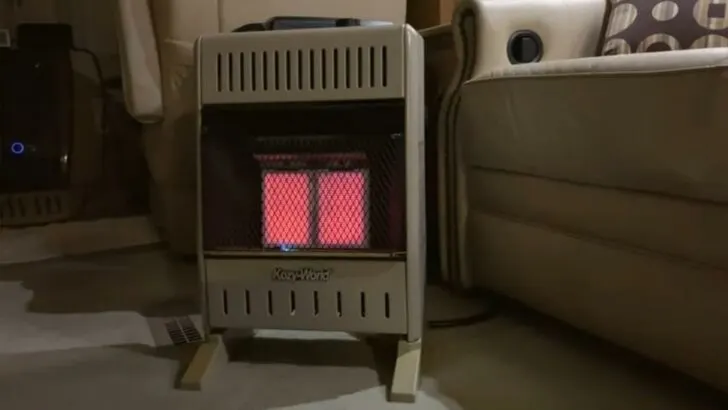


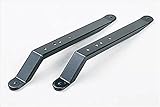



Larry Lee
Saturday 1st of October 2022
In our 40' DP we use the 2 heat pumps and electric blanket unless the temp goes below 40°F in which case I quickly whip out my auxiliary heat system BACKUP ignition key, start the diesel engine, BACKUP out of the camp site, and drive southward to warmer weather! :)
TheRVgeeks
Saturday 1st of October 2022
LOL! ???? We’re with ya on that one, Larry!
Larry Lee
Saturday 1st of October 2022
Propane heaters with low oxygen sensors WILL shut down above 7000 feet altitude. Camping above Payson AZ will do it every time. Ask me how cold we got! ;)
TheRVgeeks
Saturday 1st of October 2022
Oh no, Larry! Good to know (and sorry you had to freeze to find out)!